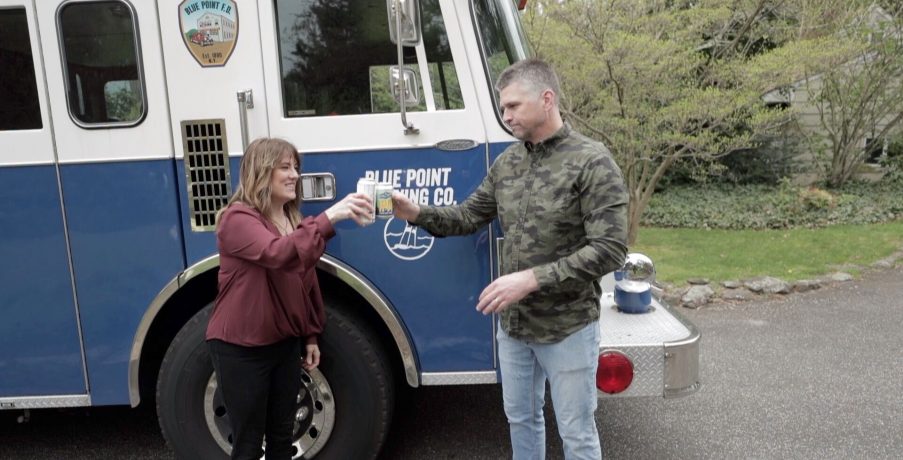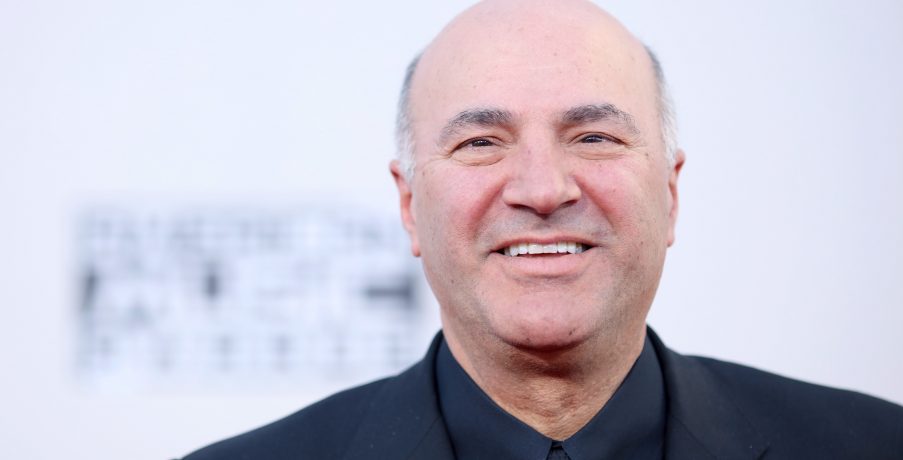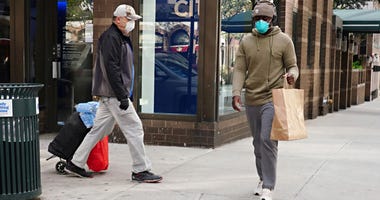
Lee Brice: Garth Brooks is my hero | Kurt's Country
Neil A. Carousso produces NewsNation original “Kurt’s Country” – a celebration of country music and a slice of Americana with host Kurt Bardella.
-
Blue Point Rewards Workers With Raises, Toasts Local Heroes As Brand Pivots To Survive
Post Views: 926By Neil A. Carousso
NEW YORK (WCBS 880) – Blue Point Brewing Company is raising a glass in honor of its essential workers and those on the frontlines of the coronavirus pandemic while it adjusts to new operations it has been thrust into amid the shutdown of hospitality businesses.
Mark Burford, founder of the Patchogue-based craft beer brand, says his company has always been about spreading cheer.
“Even when things are as tough as they are, it’s our job, internally, to bring fun and joy and we try not to lose track of that at any time,” he said on the WCBS Small Business Spotlight focusing on small business survival, sponsored by BNB Bank.
Like most companies, Blue Point is facing the reality of a changed workforce. Employees who can perform their job functions remotely are working from home. Meanwhile, social distancing has been implemented among essential workers at its brick and mortar location for those who manufacture beer. They are so busy that employees are working around the clock. Burford is staggering shifts to sanitize all equipment at its brewery.
“Everybody was given a 10 percent pay raise,” he said of his essential workers. “There’s just nothing really more important than the safety and health of the employees, so take care of people first, and then, as we slowly come back from this, we’ll see if we really ever get to where we were where everybody had to come in every day in the building.”
Blue Point is also giving away beer and food to deserving members of communities on Long Island every week as part of its social media campaign “Toast Your Hero.” They arrive to the winners’ homes or workplaces in style in a blue-pained fire truck they purchased last summer from the Blue Point Fire Department.
“It just puts a smile on everybody’s face,” Burford said, adding, “It’s just a fun thing and we all need a little bit of that levity right now.”
Customers can also buy a meal for just $8 to be delivered without contact to frontline workers from the Blue Point restaurant at its brewery in Patchogue.
He also donated beer kegs to local distilleries.
“There’s one in Patchogue called Better Man Distillery and they changed that beer that would have gone out of code and gone bad and they turned it into hand sanitizer,” Burford said.
His philosophy is simple: Do good for others and good fortunate will return.
“There’s a lot of different ways and avenues that you can help positively impact the situation,” said the brewmaster.
Blue Point’s shipping time to national suppliers has slowed slightly and orders have slumped due to restaurant closures, but local business has been “tremendous” as it serves Long Island heroes of the COVID-19 crisis.
New York State relaxed its alcohol laws to permit delivery, which has opened the door to a new business model.
“It makes you think about what other long-standing rules and regulations that typically would not be able to be changed, but in this scenario could be changed, Burford said, offering, “For other business people out there, even if there’s stuff that you never thought of that might be eliminated or changed, now’s the time to look for that.”
Hear how Blue Point is developing long-term solutions to a changed world plus Burford’s advice for other hospitality business owners on the WCBS Small Business Spotlight Podcast above and on the RADIO.COM app.
-
‘Shark Tank’ Investor Kevin O’Leary Shares His Keys To Small Business Survival
In Best Of, Featured, Guest, Interview, Latest, News Stories, Technology, The World, Top News, videosPost Views: 1,123By Neil A. Carousso
NEW YORK (WCBS 880) – Entrepreneur Kevin O’Leary stresses communication and a pivot to digital sales during the “unprecedented” coronavirus pandemic.
“Learn to communicate,” O’Leary advised in a wide-ranging interview with Joe Connolly on the WCBS Small Business Spotlight, sponsored by BNB Bank.
“Your employees and your customers: They want to hear from you every day,” he said.
O’Leary is known as “Mr. Wonderful” on ABC’s hit Friday night reality TV program “Shark Tank.” He is also a contributor to CNBC that re-runs episodes of “Shark Tank” when the market is closed. In 1986, he founded Softkey, an educational software company based in Toronto, that he sold to Mattel for $4.2 billion in 1999. He owns O’Leary Financial Group, which is a conglomerate of brands that includes investment firm O’Leary Funds. He also owns O’Leary Fine Wines. His net worth is estimated at $400 million.
“When you’re honest with your customers, they become incredibly loyal,” O’Leary said, adding, “The minute they smell B.S., you’ve lost them forever. Don’t lie to people.”
He shares his philosophy on business with Connolly, including that owners should become profitable by their third year in operations, or “take it behind the barn and shoot it.” During the global health crisis, O’Leary says owners must adjust to the changing market while playing to one’s strengths.
“They genuinely care about companies and products and services that they’ve grown to trust and they want to support them during this period of difficulty to make sure that these businesses survive,” he said.
One way to stay afloat, O’Leary underscored, is to learn digital marketing and focus one’s energy on targeting local customers.
“It means you may have to get a Shopify license, you may have to learn how to use DocuSign, you may have to understand the geo-locking tools of Facebook,” Mr. Wonderful said on the WCBS Small Business Spotlight Podcast.
“Geo-locking” is a tool within paid Facebook campaigns that allows users to target a preferred audience to optimize a paid post’s impact by demographics.
“I only want to spend my advertising dollars, reaching out to people in this specific area,” O’Leary explained, adding, “That’s what we’re finding is really working, being very concentrated in what you’re trying to do, because in times like these, you really want to play to your strengths.”
O’Leary told WCBS 880 he’s looking to cut real estate costs as his employees work from home. He said if employees are being productive and companies are using digital conferencing services and maximizing on digital marketing strategy, businesses can “save a ton of money.”
“Now the only thing is, it’s not good news for rates, it’s not good news for landlords, it’s not good news for retail space, it’s not good news for real estate, generally, because we don’t need it. Yeah, we need our houses and our apartments, but nothing else,” said Mr. Wonderful.
Hear more from entrepreneur Kevin O’Leary, including what opportunities he spotted in his “Shark Tank” investments, on the WCBS Small Business Spotlight Podcast above and on the RADIO.COM app.
-
Chinese Operatives Spreading Disinformation About Coronavirus To Sow Political Discord In US: Report
Post Views: 937By Neil A. Carousso
WASHINGTON (WCBS 880) — China is looking to amplify disinformation about the coronavirus pandemic to exploit political divisions in the United States, according to a report in The New York Times.
The Times interviewed intelligence officials who work in six different U.S. agencies. The officials believe China is using tactics that resemble Russia’s efforts to sow discord during our elections by utilizing social media trolls to push agendas to sympathetic Americans who unknowingly propagate its messages.
“We’re seeing, now, tactics that are not surprising to many of us who served in government,” said Nadia Schadlow, Ph.D., former U.S. Deputy National Security Advisor for Strategy, in an interview with WCBS 880 producer Neil A. Carousso.
China is reportedly not only using social media to disseminate false information, but also sending text messages and messages via WhatsApp, which are more difficult for law enforcement to detect because it is encrypted.
One particularly unsettling message to U.S. officials that became widespread was one claiming President Donald J. Trump was set to issue a nationwide lockdown. The White House National Security Council tweeted “FAKE” in response.
Text message rumors of a national #quarantine are FAKE. There is no national lockdown. @CDCgov has and will continue to post the latest guidance on #COVID19. #coronavirus
— NSC 45 Archived (@WHNSC45) March 16, 2020
“It’s disturbing and upsetting that Americans would be taken advantage of during such a difficult time in our country’s history,” Dr. Schadlow said.
She is currently a senior fellow at the Hudson Institute, an independent policy organization in Washington, D.C. that promotes global security through research and analysis. In 2018, Dr. Schadlow advised the Trump Administration on national security strategy as an assistant to the president on The White House National Security Council.
“China’s much more of a strategic competitor to the United States,” Dr. Schadlow explained.
She noted both Democrats and Republicans have expressed concern over the Communist Party’s economic activities, including intellectual property theft.
“Essentially it wasn’t a level playing field doing business with China,” said Dr. Schadlow.
She added that when President Trump came into office in 2017, U.S. policy towards China shifted to “push back” against its malignant activities.
The World Trade Organization indicates China is the number one exporter in the world. It is also the largest supplier of goods to the United States. China accounts for 21.2 percent of overall U.S. imports, according to The Office of the U.S. Trade Representative.
Dr. Schadlow said critical technology and medicine has been manufactured in China over the last 15 years. She believes that will change as Americans prefer to have essential supplies produced in their country or U.S. allied nations.
“I do think we are going to see a shift in those areas,” the former National Security Council advisor said, adding, “There is a recognition that it is a national security concern.”
-
Small Business Survival: Brooklyn Navy Yard Manufacturers Step Up During the COVID-19 Crisis
In Best Of, Featured, Guest, Interview, Latest, News Stories, Technology, The World, Top News, videosPost Views: 1,171By Neil A. Carousso
NEW YORK (WCBS 880) – Businesses at the Brooklyn Navy Yard industrial complex are revitalizing the country’s manufacturing amid the global pandemic.
David Ehrenberg is the President and CEO of the Brooklyn Navy Yard Development Corporation, which produces roughly $2.35 billion of annual economic output for New York City among more than 400 companies located there across various industries.
“These are not your old school manufacturers. These are very high-tech, very creative hardware companies,” Ehrenberg told WCBS 880’s Joe Connolly on this week’s WCBS Small Business Spotlight focusing on small business survival, sponsored by BNB Bank.
Brooklyn Navy Yard businesses employ more than 10,000 workers – many of whom have become essential workers as they produce vital medical equipment needed to treat the coronavirus.
“Our tenants have really been doing amazing, amazing things, producing everything from medical gowns to face shields, hand sanitizer and a series of other products,” said Ehrenberg, noting that this equipment is being shipped directly to hospitals.
Bednark Studio, Voodoo Manufacturing and Farmshelf – previous WCBS Small Business Spotlight subjects housed in the Brooklyn Navy Yard – are contributing to the broad COVID-19 fight. Bednark Studio is manufacturing face shields for frontline hospital workers in the City, 3-D-printing company Voodoo Manufacturing makes FDA-approved medical devices, and Farmshelf has been on the cutting edge of the changes in the U.S. food supply that has been accelerated by the coronavirus outbreak.
“A lot of people think that manufacturing is dead in New York and it’s not,” Ehrenberg said, adding that because of lower real estate prices in Brooklyn, growing technology companies that emphasize a high standard of craftsmanship and design can attract top talent the Big Apple has to offer.
The Brooklyn Navy Yard Development Corp. head told Connolly they started communicating with New York City officials and local hospitals about their needs before they contacted business owners to discover that they were ahead of the curve.
“We had companies who were ordering materials, who have relationships with factories in China, who were buying tens of thousands of gowns be shipped over here and donated,” he said.
Ehrenberg highlighted the “civic pride” of Brooklyn Navy Yard businesses, saying owners respond to his contacts by asking if there’s more they can do to contribute to the City’s response.
https://twitter.com/NeilACarousso/status/1252988378498379777
“The supply chains have just eased up, both, because of the level of demand, but also, you have certain countries (that) are keeping supplies for themselves right now,” he said.
His tenants have been able to manufacture fully American made products in their factories even before President Donald J. Trump invoked the Korean War era Defense Production Act to mandate U.S. companies to make medical equipment. The President and other government officials, namely New York Governor Andrew Cuomo, have revealed they are relying on countries like China, where the coronavirus originated, to import life-saving equipment such as ventilators and N95 masks.
Listen to the WCBS Small Business Spotlight Podcast above to hear how businesses in the Brooklyn Navy Yard are revolutionizing American manufacturing in the time of dire need.
-
Why Americans May Choose Safety Over Privacy In The Age Of Coronavirus
Post Views: 1,178By Neil A. Carousso
NEW YORK (WCBS 880) — Health experts are stressing the need to monitor COVID-19 patients to slow the pandemic, but Americans’ privacy is at stake.
“We’re looking for a quick solution, we’re not thinking about privacy issues, necessarily,” said Robert J. Strang, a former special agent with the FBI, Department of Justice and the Drug Enforcement Administration. He was named co-chair of the New York State anti-terrorism task force after the terrorist attacks on September 11, 2001.
“If you look back on the Patriot Act and some of the things that we decided we were going to do after 9/11 and then turn back the pages a little bit as time went on, I have a feeling that’s the same kind of situation that we’re in right now,” Strang told WCBS 880 producer Neil A. Carousso.
He is the Chief Executive Officer of Investigative Management Group where he specializes in personal and corporate security and investigations. He believes Americans support tracking in the name of national security.
“They want to be able to do whatever it takes to keep them safe, to keep their families safe, to keep their employees safe, their communities safe,” Strang said, adding, “If it means monitoring individuals who’ve had the coronavirus, if it means monitoring hospitals, I think people, at this point in time, are okay with it.”
Centers for Disease Control and Prevention Director Robert Redfield said smartphone tracking is under “aggressive evaluation.”
While the U.S. has not endorsed specific tracing technology, there are a few states looking to develop systems. Researchers at the Massachusetts Institute of Technology launched the “Safe Paths” initiative to use anonymized GPS data and Bluetooth to track interactions and notify people if they’ve encountered someone who has been infected with COVID-19. Stanford University and Seattle-based CoEpi are working with the MIT team to develop an anonymous standard for contact tracing technology.
Apple and Alphabet’s Google announced last week it will help national, state and local governments launch contact tracing apps to monitor the whereabouts of people who contracted the coronavirus.
China has taken the most aggressive steps to monitor the original center of the outbreak. The Communist Party is tracing the identities of residents who left Wuhan through mobile phone numbers and location data.
South Korea investigators are utilizing smartphone data to find where people contracted the virus. They can make that determination within 10 minutes.
Western Australian lawmakers passed a bill to install home monitors for those under quarantine.
Moscow authorities said they are using facial recognition technology to target Chinese people who break quarantine in Russia.
When asked how he would advise the Trump Administration on implementing a contact tracing program, if he were asked, Strang said he would ask those who contracted COVID-19 for “consent.”
“I think most people would cooperate and would voluntarily agree to certain restrictions on their freedom,” Strang said but stipulated there had to be a set time frame to limit the possibility of government overreach.











